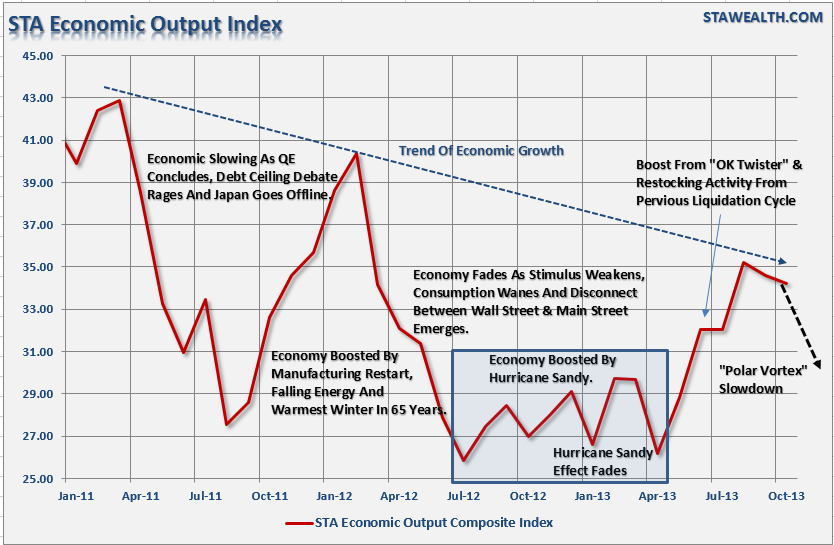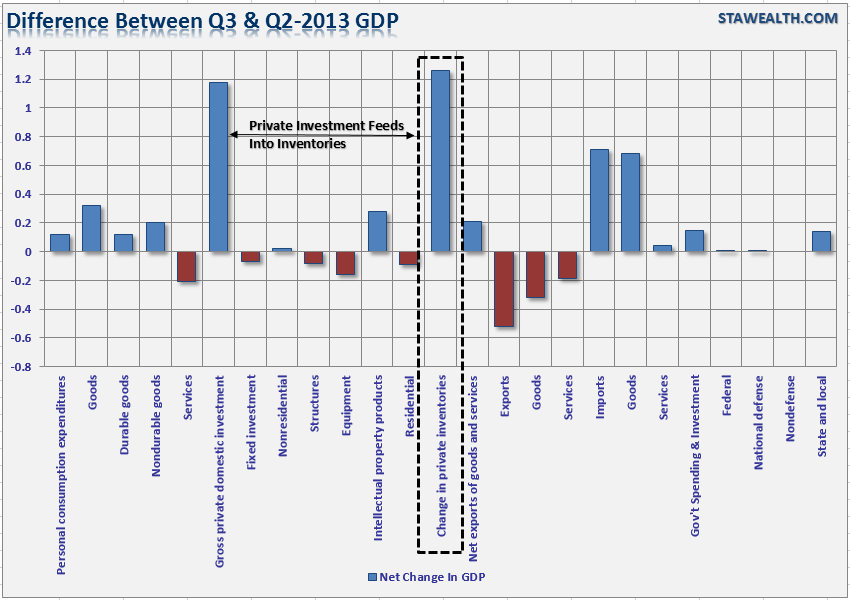Over the last few months, mainstream economists have been hopeful that after five years of economic growth that has averaged 1.87% that 2014 would be the year of acceleration. Market participants have likewise run up stock valuations in anticipation of stronger earnings growth in the months to come. However, much like Payton Manning trying to find relief from Seattle's onslaught, Mother Nature may have just crushed hopes of an economic "win" in 2014.
Last April I wrote:
"Over the last two years the economy has twice ground towards much slower rates of growth. Each time, Bernanke would make the pitch that it was just an "economic soft patch" and that the economy would strengthen later on in the year. Each time he was correct. However, the reason by which he was correct is what is most interesting. I call it the 'Mother Nature Effect.'
If we take a look back at history, you will see what I mean. In early 2011 -- Japan suffered a massive disaster of an earthquake and tsunami which devastated the country and shut down much of their production. This production break impacted the domestic economy causing weakness in economic growth.
As the Federal Reserve launched its second round of Quantitative Easing, which began the process of supporting asset prices, the strangest combination of events occurred to boost economic growth. First, Japan had struggled back onto its feet and began returning to manufacturing and production which in turned opened exports back up to the U.S. Pent up demand for products by the U.S. consumer boosted spending. Simultaneously, energy prices plunged providing a roughly $60 billion tax credit to consumers at the time which supported consumption even while wage growth weakened.
Then 'Mother Nature' answered the call by providing Bernanke with the warmest winter on record in 65 years. This allowed construction and manufacturing to continue during a period of the year when much of the Northern part of the U.S. is 'shut in' due to inclement weather. Lower needs for heating oil, and natural gas, led to a further massive tax credit for consumers which boosted consumption. The abnormally warm weather skewed the economic data higher due to the effect of the seasonal adjustments that are normally accounting for much colder weather. All in all - the boost to growth was quite substantial and came just when it was needed the most."
In 2012, we witnessed the same thing occur once again as the economy began to show signs of deterioration. As the effect of the seasonal data skews, due to the warmer than normal winter, faded and the 'Fiscal Cliff' fears pushed consumers and businesses into a defensive posture the economy slid towards much slower growth. However, once again 'Mother Nature' stepped in with 'Hurricane Sandy' which rocked the North East. Congress responded with a $60 billion aid bill that led to a rush of economic activity of rebuilding homes, replacing flooded cars, fleets of taxis, and funded the repair of massive amounts of infrastructure. However, that effect faded quickly as life returned to normal in a very short period of time."
While I knew that the Federal Reserve wielded significant power -- I didn't realize that the position of Chairman came with a direct line to "Mother Nature." Maybe there is more than just conspiracy theories when it comes to government experiments to control the weather? While I jest, it is relevant in that the effect of "Mother Nature" has provided short-term boosts to economic growth, which kept a struggling economy above the water line. Unfortunately, what "Mother Nature" has previously given - she is now taking away.
I discussed previously, that the bounce in the economic data in the last half of 2013 may have been a temporary anomaly. That statement was based on the extraordinarily weak start of 2013 due to the combined impact of Hurricane Sandy and the "fiscal cliff." To wit:
"It has been a 'Summer of Recovery' for the U.S. economy with GDP growth rising from 1.1% in the first quarter to 2.5% in the second and manufacturing surveys showed sharp jumps in new orders and outlooks. The same occurred in the Eurozone with Markit's PMI reports showing sharp bounces higher and hopes that the recession that has plagued the region was finally coming to an end. The question of sustainability remains.
I have noted several times as of late, most recently here, that the recent bumps in economic activity, particularly in the survey and sentiment data, is most likely due to short term restocking activity rather than actual economic improvement."
The recent "polar vortexes" have crippled much of the North and the North East with record low temperatures and severe weather and snow conditions. The economic impact of just the first polar vortex that hit in December is already calculated to be well above a $10 billion dollar hit to the economy. Surging electricity and heating costs are eating into real disposable incomes which is diverting consumption away from retailers. Inclement weather has shut down manufacturing activity and will crimp demand for employment and new orders as witnessed by the sharply reduced employment report in December and this week's ISM survey.
The chart below is the STA Economic Composite Index (for details on its construction read this) from January 2011 to present. As you can see, the trend of economic growth has clearly been on the decline rather than gaining strength as has been hoped by the majority of economists. I have also labeled events that have contributed to the rolling recoveries and slowdowns along the way.
Much of the recovery in the last half of 2013 was due to pent up demand following the very sluggish period from Q3-2012 through Q2-2013. That period led to a rundown in inventories, which led to a need for inventory restocking as primarily seen in Q3-2013.
With that inventory restocking cycle now complete, the current "Day After Tomorrow" syndrome will likely lead to another rundown/recovery cycle in the economy. The economic drag caused once again by "Mother Nature" combined with the impact from the onset of the Affordable Care Act is likely to keep economic growth suppressed below expectations once again this year.
Considering that the markets are already pushing valuation extremes, leverage at record levels and earnings growth derived primarily through share buy backs and "accounting magic" -- it could mean a much choppier market than witnessed in 2013. Furthermore, the decline in imports, due to a weaker consumer, is heavily impacting emerging market economies. This is a trend that is unlikely to be corrected in the short term.
What does this mean to the financial markets? I have stated for quite some time that rising interest rates do not play well with asset prices. Now, with the Fed reducing their support, it is quite likely that there could be another "leg" down in the markets before we reach a meaningful bottom. Friday's employment report will likely give us some clues as to the depth of "Mother Nature's" impact in January which could put a chill on the markets.


